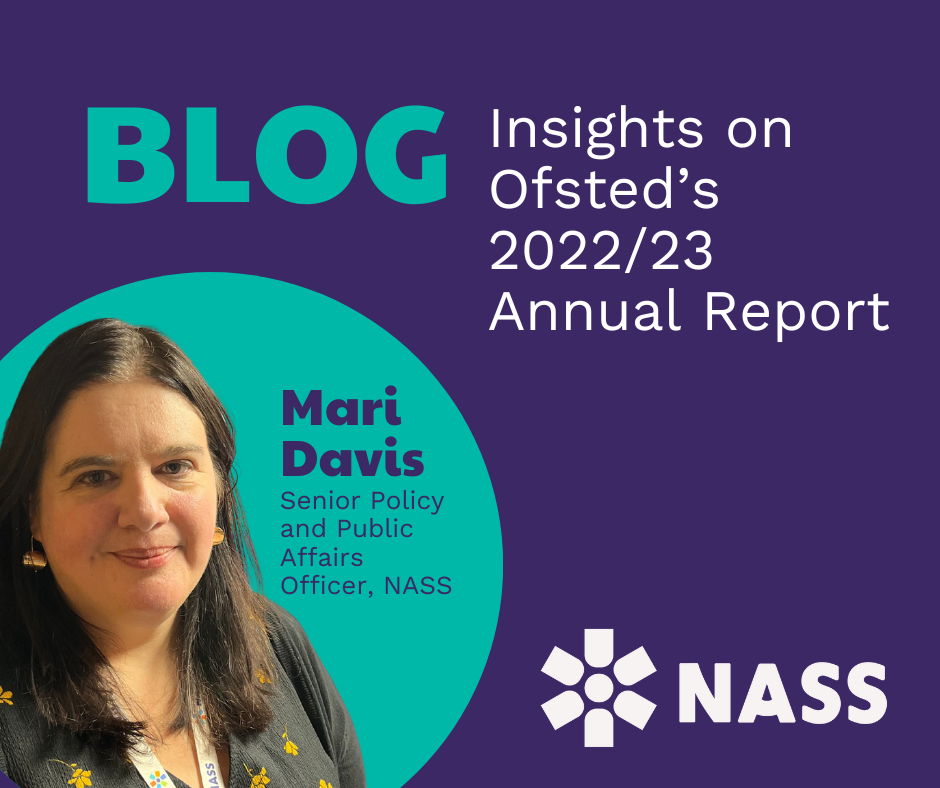 BLOG: Mari Davis, NASS Senior Policy and Public Affairs Officer, shares insights on the recently published Ofsted Annual Report.
BLOG: Mari Davis, NASS Senior Policy and Public Affairs Officer, shares insights on the recently published Ofsted Annual Report.
The report, covering 2022/23, presents findings from its inspections across early years childcare, schools, further education and skills, and social care.
Ofsted concludes that that while there are reasons for optimism, as education and children’s social care continue to recover from the lingering impact of the pandemic restrictions, certain areas remain worrying. Notably, the continued underperformance of Area SEND Inspections raises concerns, even with the new framework introduced this year.
Between January and August 2023, Ofsted and CQC inspected 16 local area partnerships. While 5 showed positive outcomes and experiences for children and young people with Special Educational Needs and Disabilities (SEND), 6 exhibited inconsistent outcomes and experiences and the remaining 5 were found to have widespread and/or systematic failings.
A strong performance from special schools across all settings
Ofsted notes that in the past year there has a marked growth of 64% in the number of pupils with an Education, Health, and Care (EHC) plan. This rise has increased demand on special school capacity, with around 8% of students with SEND educated in non-maintained and independent special schools. The report also accepts that there are many pupils who are awaiting specialist placements that are being referred to Alternative Provision indefinitely or their parents see no option other than home-schooling.
Ofsted also observes that high rates of SEND among children in care has not always been fully recognised in local strategy or government policy and that it hopes social care and SEND reforms provide the opportunity to align policy and practice for these children.
Ofsted reports that the performance of the special school sector remains strong. It found that the proportion of good or outstanding special schools has remained relatively stable since last year, with 8 out of 10 special schools (state-funded and independent) achieving ratings of outstanding or good.
Looking at the overall effectiveness of special schools at the year end, Ofsted figures show that 81% of independent special schools were graded either outstanding or good and 89% of state-funded special schools (this includes non-maintained special schools) rated either outstanding or good. This strong performance was also reflected in the overall effectiveness of residential special schools (110 settings), including those registered as children’s homes (56 settings). 82% of those registered as children’s homes were rated good or outstanding and 93% of all residential special schools were rated good or outstanding.
Overall, this achievement highlights the sector's commitment to providing high-quality, specialist provision for children and young people with SEND, regardless of the increasing financial challenges and uncertainty that brings.
Recruitment, retention and wellbeing of staff
It is of little surprise to most to see Ofsted flag concerns over the prevalent recruitment and retention crisis affecting education and social care. The report states:
In schools, staff shortages are reducing expert teaching, increasing stress, limiting intervention when children struggle, and creating a barrier to teachers accessing training and development.
The urgency for a proper workforce strategy for education is evident. For some time now, NASS has advocated for the Department for Education to develop such a strategy, and we will persist in urging for its development.
The future of inspections
Looking ahead to 2024, there is hope for improvements in Ofsted's inspection approach that will allow for better dialogue and understanding between schools and inspectors. For example, we would like to see Ofsted continue to improve the process for joint Ofsted/CQC inspections, and establish a more nuanced understanding of residential special schools and special schools with children's homes attached.
On November 24th, Ofsted announced the implementation of four changes from its recent consultation on post-inspection and complaints handling. We also hope that Ofsted will take on board any findings and recommendations from the ongoing inquest into the death of Ruth Perry, as well as the recent National Education Union (NEU) reports.